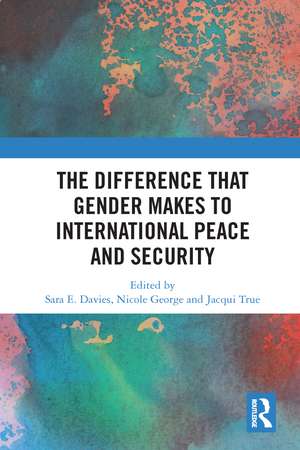The Difference that Gender Makes to International Peace and Security
Editat de Sara Davies, Nicole George, Jacqui Trueen Limba Engleză Paperback – 30 iun 2020
The chapters in this book were originally published in a special issue in the International Feminist Journal of Politics.
Preț: 378.92 lei
Nou
Puncte Express: 568
Preț estimativ în valută:
72.50€ • 75.71$ • 59.87£
72.50€ • 75.71$ • 59.87£
Carte tipărită la comandă
Livrare economică 15-29 aprilie
Preluare comenzi: 021 569.72.76
Specificații
ISBN-13: 9780367588427
ISBN-10: 0367588420
Pagini: 134
Dimensiuni: 156 x 234 mm
Greutate: 0.2 kg
Ediția:1
Editura: Taylor & Francis
Colecția Routledge
Locul publicării:Oxford, United Kingdom
ISBN-10: 0367588420
Pagini: 134
Dimensiuni: 156 x 234 mm
Greutate: 0.2 kg
Ediția:1
Editura: Taylor & Francis
Colecția Routledge
Locul publicării:Oxford, United Kingdom
Cuprins
Introduction: The difference that gender makes to international peace and security Sara E. Davies, Nicole George and Jacqui True 1. The politics of counting and reporting conflict-related sexual and gender-based violence: the case of Myanmar Sara E. Davies and Jacqui True 2. A “shift in attitude”? Institutional change and sexual and gender-based crimes at the Extraordinary Chambers in the Courts of Cambodia Emma Palmer and Sarah Williams 3. Invisible labor, invisible bodies: how the global political economy affects reproductive freedom in the Philippines Maria Tanyag 4. Policing “conjugal order”: gender, hybridity and vernacular security in Fiji Nicole George 5. The logic of protection: narratives of HIV/AIDS in the UN Security Council Maria Jansson 6. Women in power and power of women: the Liberian experience Oasis Kodila-Tedika and Simplice A. Asongu 7. Gender, peace and security in the Australian Defence Force: Sarah Hewitt in conversation with Captain Jennifer Wittwer, CSM, RAN Sarah Hewitt 8. Making these beautiful resolutions real: Sara E. Davies in conversation with Devanna de la Puente Sara E. Davies
Notă biografică
Sara E. Davies is Associate Professor at the Centre for Governance and Public Policy, School of Government and International Relations, Griffith University, Australia and an Australian Research Council (ARC) Future Fellow.
Nicole George is a Senior Lecturer in the School of Political Science and International Studies at the University of Queensland, Australia. Nicole's research focuses on the gendered politics of conflict and peacebuilding, violence, security and participation, broadly conceived.
Jacqui True is Professor of Politics & International Relations and an Australian Research Council Future Fellow at Monash University, Australia. She is specialist in Gender and International Relations. Her research is focused on understanding the political economy of post-conflict violence against women and the patterns of systemic sexual and gender-based violence in Asia Pacific conflict-affected countries.
Nicole George is a Senior Lecturer in the School of Political Science and International Studies at the University of Queensland, Australia. Nicole's research focuses on the gendered politics of conflict and peacebuilding, violence, security and participation, broadly conceived.
Jacqui True is Professor of Politics & International Relations and an Australian Research Council Future Fellow at Monash University, Australia. She is specialist in Gender and International Relations. Her research is focused on understanding the political economy of post-conflict violence against women and the patterns of systemic sexual and gender-based violence in Asia Pacific conflict-affected countries.
Descriere
This book showcases the relevance of a gender perspective for explaining contemporary issues of peace and security. It challenges prevailing representations of political order and stability by drawing from the insecurities experienced by women and girls in post-conflict transitions. The chapters in this book were originally published in a specia
